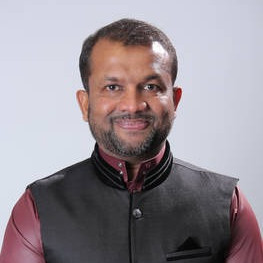Imam Irshad Osman (Naleemi)
Biography Narrative
Khateeb, Danforth Islamic Centre and Toronto Islamic Centre
Imam serves as a Khateeb at Danforth Islamic Centre, Toronto Islamic Centre and other mosques in the GTA. He completed his bachelor’s degree in Arabic and Islamic studies at Naleemiah International Islamic University in Sri Lanka and also holds a master’s degree in public policy and management from the University of Manchester, UK and graduate training in theology from the Leiden University, in the Netherlands. Imam Osman is a fundraising consultant by profession who has received the Certified Fundraising Executive (CFRE) designation in Canada. He has worked at United Way Greater Toronto, Silent Voice Canada, Women’s College Hospital Foundation, and International Development and Relief Foundation overseeing fundraising portfolios worth of millions of dollars to support local and International causes. He was selected in the first cohort of the Association of Fundraising Professionals “Fellowship in Inclusion and Philanthropy” in 2015/2016. As a religious leader in the community, Imam volunteers his time with many Toronto-based organizations advocating for social justice, minority rights, true inclusion, anti-racism and anti-hate, and supports interfaith collaboration to find solutions to common issues, such as poverty and homelessness, faced by the community. In 2020, he received the Interfaith Innovation Fellowship granted by Interfaith Youth Core based in Chicago. As part of the fellowship project, he is developing a toolkit for fundraisers on how to engage and cultivate religiously active donors by understanding their faith-driven motivations and religious sensitivities. He also serves in the leadership team of “Anti-Semitism and Islamophobia: Moving from Hate to Hope” initiative and volunteers his time as a career and civic engagement mentor for newcomers at Culturelink.
Interreligious Activities and Initiatives
Engaging Youth in Muslim-Indigenous Relationship
To repair the damages done by the colonial settler policies to the Indigenous peoples’ traditional culture, languages, spirituality, and identity, the Truth and Reconciliation Commission of Canada issued 94 “calls to action” in their 2015 report to further the reconciliation between Indigenous and non-Indigenous communities. Canada’s commitment to the UN’s Sustainable Development Goals (SDG) too included a commitment to “leave no one behind” including its Indigenous population. However, public awareness for such relationship-building measures among Muslims, who are part of settler colonialist history through migration, is lacking and, even if it does, that would be limited to advocacy and relief support. Hence, this initiative focused on developing relationships between Muslim and native communities through inter-religious education and awareness at the grassroots level. 25 Muslim youth were selected out of 52 applicants and were trained on inter-religious dialogue and interfaith literacy while being taught about the Indigenous history, culture, faith, spirituality, and core values. All Muslim participants appreciated the opportunity to learn about Indigenous peoples’ beliefs, visit their reserve and places of worship and have their understanding enhanced to the discrimination and oppression the native populations had to face to retain their spirituality, traditions, and culture. This unique, first-of-its-kind initiative also drew the attention of media and the wider Muslim community and there is a request to continue the project in the New Year.

